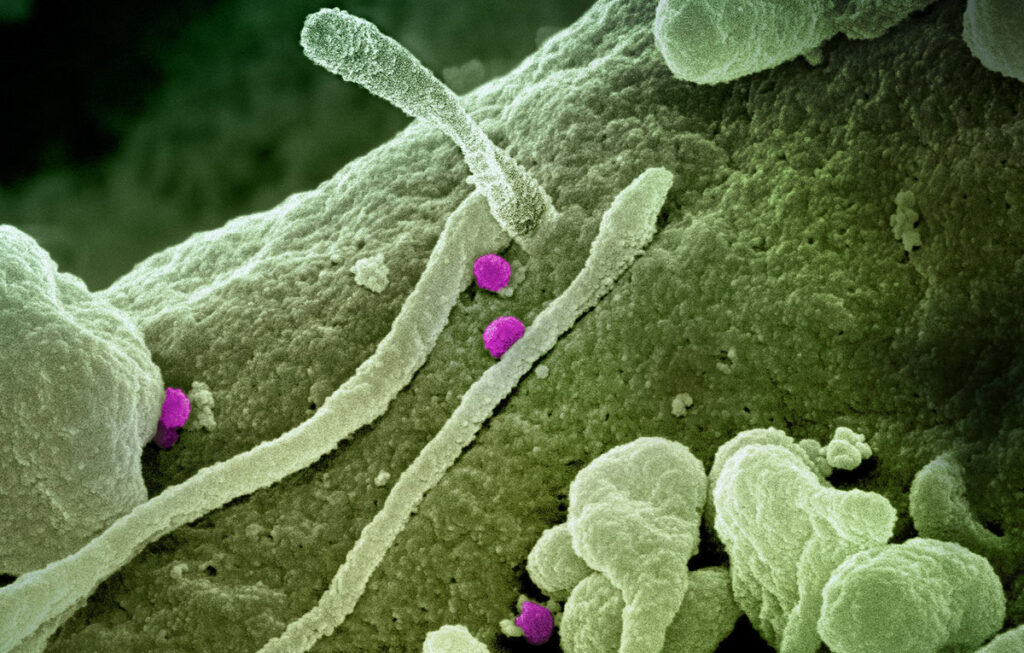A newly published study in npj Vaccines presents promising results for a single-dose vaccine that fully protects mice against a lethal strain of Crimean-Congo hemorrhagic fever virus (CCHFV), a high-consequence zoonotic pathogen with no approved human vaccine. The research was conducted by scientists at the Laboratory of Virology and the Rocky Mountain Veterinary Branch within the Division of Intramural Research at the National Institute of Allergy and Infectious Diseases (NIAID), National Institutes of Health (NIH), based in Hamilton, Montana.
The recombinant vaccine is based on vesicular stomatitis virus (VSV), a platform previously used in the licensed Ebola vaccine (Ervebo). The findings mark a significant step forward in developing an effective vaccine for a disease endemic across Africa, Asia, the Middle East, and Eastern Europe.
Urgent Need for CCHFV Vaccines
CCHFV causes a severe, often fatal illness in humans, with case fatality rates ranging from 5% to 30%. The virus is transmitted through tick bites or contact with infected animal or human blood. Although a limited-use inactivated vaccine exists in Bulgaria, there is currently no internationally approved vaccine for human use. Vaccine development has been challenged by the virus’s genetic diversity—particularly in the glycoprotein genes—necessitating new approaches that offer cross-strain protection.
VSV Platform and Vaccine Candidates
The researchers developed and tested three live-attenuated recombinant VSV vaccine candidates:
- VSV-CCHFnp1: Expressing the CCHFV nucleoprotein (NP) with full-length Ebola virus glycoprotein.
- VSV-CCHFnp2: NP paired with a truncated Ebola GP.
- VSV-CCHFgpc: Expressing the CCHFV glycoprotein precursor (GPC).
Mice received a single vaccine dose and were later challenged with either homologous or heterologous strains of CCHFV.
Key Finding: VSV-CCHFnp1 Provides Complete Protection
The VSV-CCHFnp1 vaccine provided 100% protection against a lethal heterologous strain (UG3010), demonstrating the broad protective potential of targeting the conserved NP antigen. Mice vaccinated with VSV-CCHFnp1 showed:
- Full survival
- No weight loss
- Significantly lower viral loads in blood and organs
- Markedly reduced liver and spleen pathology
This protection was driven by strong non-neutralizing antibody responses, particularly IgG2c, rather than traditional virus-neutralizing antibodies.
Partial Protection with GPC-Based Candidate
The VSV-CCHFgpc candidate, which induced both neutralizing antibodies and T cell responses, conferred only partial protection (~60%) against heterologous challenge. It performed better against homologous virus (same strain used in vaccine), preventing weight loss and minimizing tissue damage. However, genetic variability in CCHFV-GPC limits its utility for broader protection.
Implications: Nucleoprotein as a Universal Target
The study supports using CCHFV’s nucleoprotein as a vaccine antigen due to its high conservation across strains. In contrast to the variable glycoproteins, NP-based immunity appears to provide consistent protection, making it an attractive target for global vaccine efforts.
Given the impracticality of developing region-specific vaccines for every CCHFV clade, VSV-CCHFnp1 may represent a viable, scalable solution for widespread use, particularly in resource-limited endemic areas.
Path Forward
Researchers suggest multiple next steps to optimize the approach:
- Combine NP and GPC antigens into a single or blended VSV vaccine
- Explore prime-boost strategies using multiple VSV constructs
- Test in additional animal models to evaluate long-term efficacy and safety
While the vaccine uses the Ebola GP as a helper protein to support viral replication, this has not posed a significant barrier in the development of similar VSV-based vaccines.
This preclinical study demonstrates that a single-dose VSV-based vaccine targeting the CCHFV nucleoprotein can confer complete protection against lethal infection in mice. These findings justify continued development of VSV-CCHFnp1 and offer a potential path toward a broadly effective vaccine for one of the world’s most dangerous tickborne viruses.
Tipih, T., Leventhal, S.S., Meade-White, K. et al. Single dose VSV-based vaccine protects mice against lethal heterologous Crimean-Congo hemorrhagic fever virus challenge. npj Vaccines 10, 109 (2025). https://doi.org/10.1038/s41541-025-01164-3


